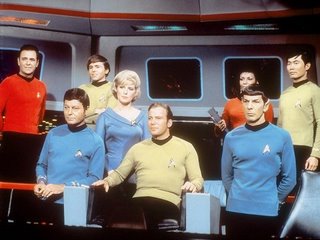Star Trek first aired on September 8, 1966.
When Star Trek debuted it was not successful; ratings were low and advertising revenue was lackluster. During the show's second season, the threat of cancellation loomed. The show's devoted fanbase ("Trekkies") conducted an unprecedented letter-writing campaign that petitioned NBC to keep the show on the air. The fans succeeded in gaining a third season, however NBC moved the show to 10 P.M. on Fridays (the 'Death Slot', so named because relatively few people watch television at that time), and ratings remained poor. The series was cancelled at the end of its third season. Although cancelled after its relatively short run, the program was placed in syndication, where it spawned a strong fan following.
Myself, included.
I first watched Star Trek in 1970 or 1971, when on a cold, dreary Sunday afternoon I stumbled upon my Dad watching a non-sports and non-WWII TV show on WJAR-TV out of Rhode Island. I distinctly remember two characters on screen. One, a man in a gold uniform referred to as "Captain" and his partner, a tall man with pointy ears and arched eyebrows wearing a blue uniform. He was cool. Anyway, they were hunting a creature that was killing miners.
"What's this?" I asked. "It's called Star Trek," my Dad replied. "Sit down. You might like it." I did sit down, and watched in amazement as the "monster" that burned people to a crisp (and was really creepy to young me) was actually a mother "horta" who was defending her unborn eggs from the destructiveness of the miners, who view the" eggs" as "useless silicon." There were lasers and mind melds and a simple country doctor and a really cool looking spaceship and all of these added up to make one really great story.
Man, I was hooked.
Here's some background: Set in the 23rd century, Star Trek follows the adventures of the starship Enterprise and her crew, led by Captain James T Kirk and his First Officer Mr. Spock. They were joined by Dr. Leonard McCoy, Lt. Cmdr Montgomery Scott (Chief Engineer), Lt. Nyota Uhura (Communications Officer), Lt. Hikaru Sulu (Chief Helmsman), Ensign Pavel Chekov (Navigator) and Nurse Christine Chapel. They are pictured below:
Furthermore, Shatner's voiceover at the beginning of each episode stated the ship's purpose:
Space, the final frontier. These are the voyages of the starship Enterprise. Its five-year mission: to explore strange new worlds, to seek out new life and new civilizations, to boldly go where no man has gone before.
To me, there has never been a better designed, more majestic ship than the original USS Enterprise:

Every civilization needs their myths. I have said before that when I was a kid, the characters of Star Trek were every bit as real, and as vibrant, to me as the legends of the Round Table, Robin Hood or The Iliad. Larger than life men boldy going forth to explore the unknown, to extend the hand of friendship to new civilizations and to defend themselves or their beliefs when necessary. As I got older, I realized that their stories are "just" stories but they are tales that need to be told. And retold, so that the myths become a part of the culture and are passed on from generation to generation.
Just as my own father did with me, I started passing the torch to Jenna early on in life. One time Pam even commented that "There's plenty of time to turn her into a geek." True story. Equally true was when Jenna was two years old she was sitting on my lap as we watched a rerun of "Star Trek - The Next Generation". When the opening credits rolled, and the ship went soaring past, Jenna leaned forward excitedly, pointed at the screen and squealed "Enterprise!"
I was so proud.
Since then Jenna and I have watched all of the original Star Trek movies and she has enjoyed them all; probably as much out of her love for me as for their own intrinsic values. However, lately she has been watching Star Trek 2.0 on G4 which reruns the original series with an interactive content. When I asked if she was enjoying the episodes, she said, "they're actually pretty good".
Now, Jenna had previously told me that the special effects in the original "Star Wars" were just horrible and that Mark Hamill was a really bad actor. For Jenna to actually enjoy the PLOT of a Star Trek episode and sidestep the 40 year-old FX or Shatner's scene chewing is a testament to Gene Roddenberry and the integrity, creativity and timelessness of the original Star Trek.
And so, on this day, I want to pay homage to a show that lasted for 79 episodes before it was ignobly cancelled and sold off to syndication. Once there it flourished, and begat the following: 1 animated series:Star Trek:The_Animated_Series,
3 sequel series: Star Trek:The Next Generation, Star Trek:Deep Space Nine, Star Trek: Voyager
one "prequel" series: Star Trek: Enterprise
and 10 movies:
Star Trek:The Motion Picture
Star Trek II: The Wrath of Khan
Star Trek III: The Search for Spock
Star Trek IV: The Voyage Home
Star Trek V: The Final Frontier
Star Trek VI: The Undiscovered Country
Star Trek:Generations
Star Trek:First Contact
Star Trek:Insurrection
Star Trek:Nemesis
Quite an accomplishment for a failed series, indeed.
I have said before, every civilization needs their myths.
We have Star Trek.
And I have been really glad that we do.



